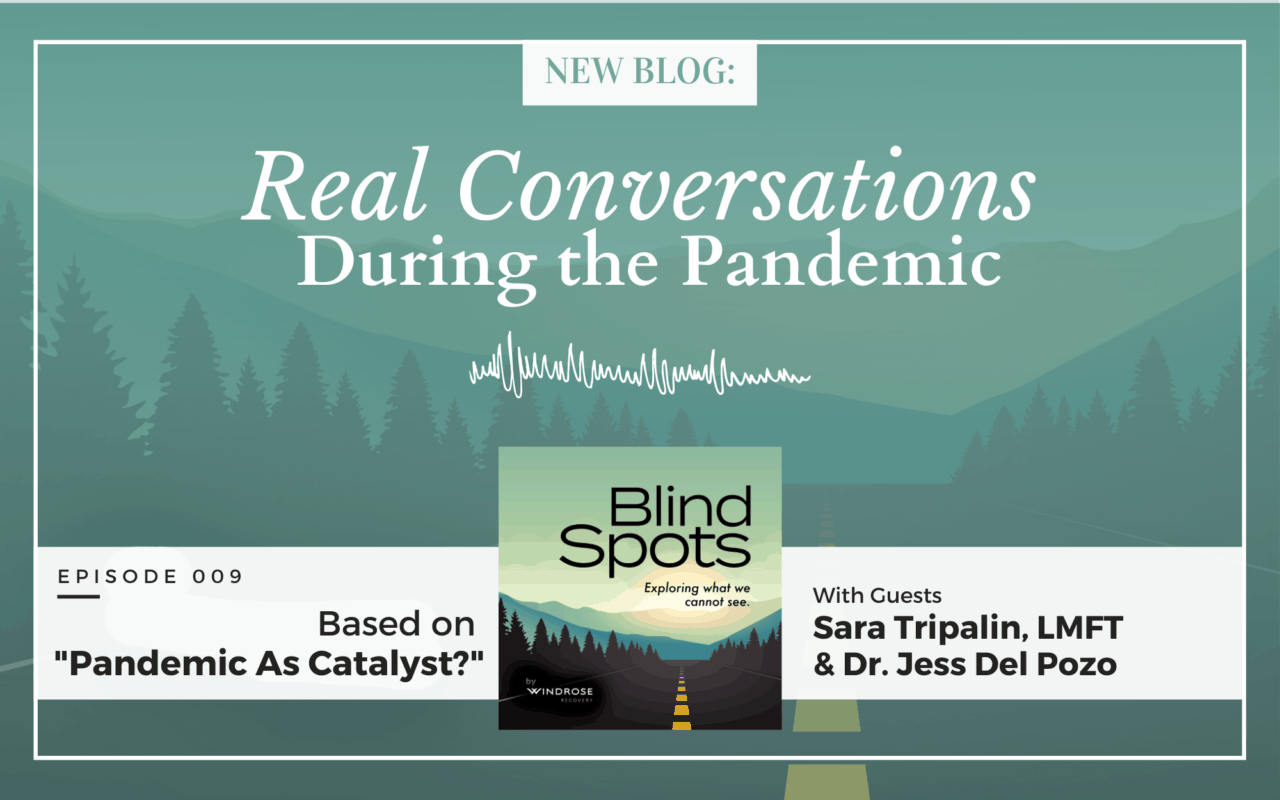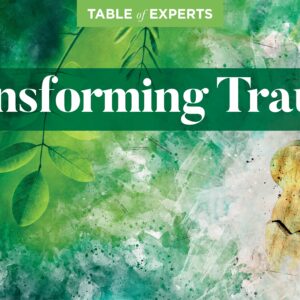
“Last year, the pandemic crisis presented itself in a matter of days and yet the reality took months to fully settle in, to grasp the fundamental shift in the way things are. Our lives today may seem unrecognizable from our pre-COVID state of operating. We may have learned to tolerate this new reality in different ways, but have we given ourselves the space to process all that has taken place?”
Our new blog highlights this important conversation that took place on episode 9 of the Blind Spots Podcast, an exploration from the lens of guests Sara Tripalin, MS, LMFT, Dr. Jessica Del Pozo, and host, Dr. Chantelle Thomas.
Pandemic as Catalyst?
For many of us, this past year has shaken us to our core. We’ve learned new things about ourselves during this year of increased stress, some of them good, some of them hard to acknowledge. Maybe there have been moments when we have felt like survivors, possibly pulling strength from what is hidden deep within us. Maybe there were moments where we questioned how we could go on. What has become clear is the critical importance of embracing flexibility, adjusting to a new reality, and finding some self-compassion along the way.
Last year, the pandemic crisis presented itself in a matter of days and yet the reality took months to fully settle in, to grasp the fundamental shift in the way things are. Our lives today may seem unrecognizable from our pre-COVID state of operating. We may have learned to tolerate this new reality in different ways, but have we given ourselves the space to process all that has taken place?
Reflecting on our reality
Living with the pandemic for over a year provides an opportunity to explore its impact: How has the pandemic affected me? How has it changed me personally, or professionally, or in my home? How have I learned to adapt, and what have I gained from the process?
The Blind Spots Podcast (Episode 9: Pandemic As Catalyst) involves a conversation between mental health providers. Host Dr. Chantelle Thomas and guests Sara Tripalin, MS, LMFT, and Dr. Jessica Del Pozo explore the collective trauma experienced in the past year and how each is navigating this according to their roles and responsibilities as clinicians and leaders within their perspective professional spheres.
Although we know that the pandemic has affected us in similar and unique ways, this conversation highlights the challenges inherent to those who are providing therapeutic support and treatment to both the public and their staff/colleagues.
As mental health providers, we are vulnerable to absorbing the worries, anxiety, and fears of our clients. We hold them, explore them, challenge them, and soothe them. We attempt to make meaning from and within them. We are trained for this type of work, and yet, this time around, we have found ourselves witnessing the same intensity of uncertainty as our clients. A danger for many providers involves the pressure to appear as though they had some evolved understanding or awareness of what was coming next. We are supposed to be “experts” in coping, and yet when faced with an ever-evolving crisis, providers were faced with a choice to either embrace their own vulnerability by bringing it into their work space or become more isolated and alone. Sara Tripalin beautifully highlights the unique opportunity for connection that evolved:
“I think that this year really married the common humanity that is shared between the clinician and the client. And there was something beautifully powerful about that.”
-Sara Tripalin, MS, LMFT, Owner of Peace of Mind Therapy in Madison, WI.
With each new significant stressor piled on, our bodies and minds strained in their task to return to a place of both psychological and physiological safety. Dr. Chantelle Thomas points out that from the first days of the pandemic, she could feel this at a nervous system level. As she struggled to comprehend the changes taking place and attempted to grapple with the unknown, she observed her own body reflexively becoming more vigilant and physically heightened. Dr. Del Pozo succinctly puts this into perspective:
“The way we are wired—physiologically and emotionally—is to anticipate what is next. And when you can’t do that well, it’s a helpless feeling”
-Dr. Jessica Del Pozo, Clinical Psychologist and Owner of Lemke Health Partners in Auburn, CA.
The range of responsibility did not stop with clients and employees during this time, for many, it also extended into our homes where our children, and sometimes our partners, looked to us for direction. As observed by Sara Tripalin (Thomas, 2021), we were doing so with less physical, emotional, and tangible resources. Reading the body’s cues of needed self-care while attempting to care for others required the constant navigation of fear and “not knowing” while feeling the pressure of moving through this time with grace.
This understandably opened the door for guilt and “imposter syndrome” to take root. The pressure to appear poised and competent despite your own internal uncertainty can heighten the amount of internal conflict and anxiety. Sara Tripalin speaks about a sense of “reckoning” that may come from being focused solely on attending to and supporting the needs of others without processing what has and is transpiring. As mental health clinicians, there is a unique opportunity to be honest with each other about the struggles we are feeling and where we may need additional support. For many, there is trepidation that slowing down to acknowledge the impact might unleash an uncontrollable emotional cascade. However, simply naming our vulnerability in this space may give way to facilitate deeper moments of connection with each other.
It’s conversations like these that can remind us that there is an opportunity to move toward the vulnerability and discomfort. There is a chance to move into a more authentic space with clients by being “alongside them” and naming the way in which we are occupying a similar space. We get to ask ourselves if we can do the things we are asking of our clients; how do we implement the basics of self-care to ensure we have the stamina and reserve(s) to support others?
We can also use conversations with those we trust to help us gain deeper insight and understanding. We can view the pandemic as a “catalyst for what needed to occur anyway,” as explained by Dr. Jessica Del Pozo (Thomas, 2021), and we can lean into the depth and intentionality we have found in friendships. In this way, we may feel more connected to each other in and through this struggle by prioritizing what values we share.
For more extensive conversation, you can listen to episode 9 of the Blind Spots Podcast, and wonder, has the pandemic been a catalyst for change in your life?
If you’re looking for more information about Windrose Recovery’s family of treatment programs, or are concerned about how the last year has affected someone close to you in their reliance on drugs or alcohol, reach out today to speak with our admissions team.


